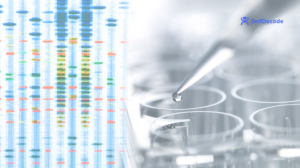Genetic testing is changing how couples plan for children. It gives people tools to understand the risks of passing on inherited conditions. What once required specialist access is now easier to get. DNA analysis, online reports, and AI-backed tools such as SelfDecode make the carrier screening process clearer and more available with easier access.
Genetic Testing for Couples
Genetic testing for couples helps identify if both partners carry genes for inherited diseases such as cystic fibrosis, Tay-Sachs, and sickle cell anemia. If both partners carry the same gene, their child may inherit the condition. Studies have found that about 2-3% of couples, despite being completely unrelated, were at risk of transmitting a genetic disorder to their children.
This kind of testing helps couples make more informed decisions together. They may consider going the route of IVF with genetic screening, use donor sperm or eggs, or plan for early treatment in advance to making the decision to get pregnant. Tools like SelfDecode give couples risk scores and plain-language reports to support these decisions.
Where to Get Genetic Testing Before Pregnancy
People often ask: where to get genetic testing before pregnancy? Some can go through their OB-GYN or visit fertility clinic, while others might opt for more convenience and use online services like SelfDecode that are able to send test kits by mail. Hospitals may also offer testing, especially if there’s a family history of genetic conditions, but this process usually ends up being more intensive and can also be cost-prohibitive. Instead, at-home kits offer privacy and convenience. These services often include digestible results, help with interpretation, and offer user experience support.
Carrier Testing During Pregnancy
Carrier testing during pregnancy checks if a parent carries a gene for a serious condition. If both parents carry the same gene, there is a higher chance the baby will inherit the condition. Testing is done with blood or cheek swabs. Results can inform further testing or treatment. Since this kind of testing doesn’t offer a preventative approach, it can benefit couples to consider other types of testing that happens earlier in the process. In some cases, early planning improves health outcomes for the baby.
Prenatal DNA Testing
One of the biggest chromosomal issues that prenatal DNA testing can detect is Down syndrome (trisomy 21), amongst other similar conditions. Non-invasive prenatal testing (NIPT) analyzes fetal DNA in the mother’s blood and has over 99% sensitivity as well as specificity for trisomy 21. Services like SelfDecode combine this data with family health history for a clearer picture of risks that helps modern couples make more informed decisions together.
DNA Testing While Pregnant
DNA testing while pregnant may include things like:
- A blood test that checks the baby’s chromosomes
- Cheek swabs from the parents as a way to assess inherited risks
- Optional panels that can screen for other rare conditions
Some services can offer even more preventative details by being able to flag and report how the baby might process medicine or be able to absorb certain nutrients.
MTHFR Gene Mutation and Pregnancy
The MTHFR gene mutation and pregnancy connection is about folate metabolism. This gene helps process folate, which is key for fetal development. Studies show that mutations in MTHFR may increase the risk of pregnancy complications such as neural tube defects. If detected, doctors may suggest methylfolate supplements instead of folic acid. Platforms like SelfDecode give supplement recommendations based on DNA.
Prenatal Genetic Counseling
Regardless how far along you might be in your family planning journey, genetic counselors help parents feel more prepared. Services like SelfDecode add visual tools and plain-language summaries to support these sessions. Prenatal genetic counseling supports parents in understanding genetic testing. Counselors explain the results, assess risks, and offer next steps – which also might include more testing or discussing treatment options.
How Much Is Genetic Testing for a Baby?
Many ask: how much is genetic testing for a baby?
The reality is that costs can vary, and quickly climb towards become inaccessible:
- Carrier screening: $100 to $500 per person
- Non-invasive prenatal testing (NIPT): $200 to $1000
- Whole genome or exome sequencing: $1000 or more
While insurance may cover tests if there’s a medical reason, online services usually can provide clear pricing and even offer lower costs. SelfDecode offers an option for families looking for affordable and private access to DNA analysis. By offering clear reports and long-term guidance into genetic insights, it supports both immediate planning and ongoing wellness in an accessible way.
Genetic Carrier Screening in Pregnancy
Genetic carrier screening in pregnancy checks if a parent carries genes that could cause disease. Most people do not know they are carriers, but a major study showed that over 76% of women who were screened were carriers for at least one condition.
Testing helps parents understand their risk. If both carry the same gene, they can plan next steps. New panels can screen for hundreds of conditions. AI tools help explain results and suggest options.
SelfDecode includes access to these tools in its platform. With personalized health reports and ancestry-adjusted insights, couples can see where risks may be higher and how to act.
How Can Parents Determine If Their Growing Fetus or Newborn Carries a Disease-Causing Allele?
Many parents ask: how can parents determine if their growing fetus or newborn carries a disease-causing allele?
Here are the main options:
- Carrier testing of both parents, before or during pregnancy
- Prenatal tests like NIPT or CVS
- Newborn screening, which is done after birth in most states
When used together, these tests give a broad picture of health risks.
SelfDecode’s tools help make this process easier to follow. Couples can access personalized dashboards and AI-based health assistants that provide explanations for complex genetic information.
Genetic Testing Before Getting Pregnant
Overall, genetic testing before getting pregnant is becoming part of routine care that most couples should consider as part of their family planning. Early screening gives couples time to understand risks and make plans. SelfDecode and similar tools provide private testing, clear reports, and guidance. These services support better decisions through more comprehensive understanding of your own DNA.
Genetic testing gives couples clear answers during family planning. From finding carrier status to understanding a fetus’s health, today’s tools offer better insight with fewer barriers. It’s no longer just for rare conditions. For many families, it’s now a standard part of planning for a healthy child.
SelfDecode brings the carrier screening process within reach. It helps users identify genetic risks, interpret results with confidence, and take steps grounded in data. With its secure platform and personalized health guidance, it’s a valuable resource for couples preparing to grow their family.





